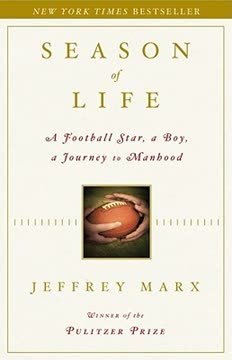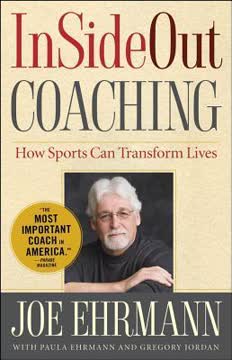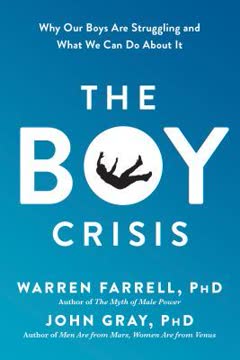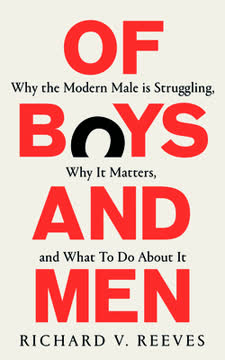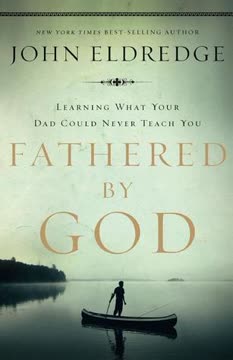Key Takeaways
1. Redefining Masculinity: Beyond Ball Field, Bedroom, and Billfold
The problem with all this stuff is that it creates a paradigm that basically sets men up for tremendous failures in their lives.
False masculinity's pitfalls. Society often defines masculinity through a "ball field to bedroom to billfold" progression: athletic ability in youth, sexual conquest in adolescence, and economic success in adulthood. This paradigm, Joe Ehrmann argues, is a lie that leads to tremendous dysfunction and isolation. It fosters a culture of comparison and competition, where men constantly measure themselves against others based on external achievements.
Consequences of comparison. This relentless comparison and competition leave most men feeling isolated and alone, unable to form genuine connections. Joe notes that the typical male over thirty-five has less than one true friend with whom he can share his deepest thoughts. This "pseudo-community" prevents authentic relationships, as men hide behind a facade of external masculinity, fearing that revealing their true selves would lead to rejection.
A flawed paradigm. The focus on power, possessions, and performance creates a life centered on "I, me, mine," rather than on meaningful connection. This self-centered approach, Joe believes, is a primary driver of societal problems and personal brokenness. It prevents men from understanding their true value and purpose, leading to an unfulfilling existence.
2. Relationships as the Core of Manhood
If I blow it there, or if I blow it as a dad, nothing else really matters. All the power and prestige and possessions in the world will never make up for failed relationships.
Relationships define humanity. Joe Ehrmann's definition of masculinity is rooted in relationships: how one performs as a son, father, husband, brother, and friend. He asserts that at the end of life, success is measured not by what one has acquired or achieved, but by the quality of these connections. This relational focus is paramount, overshadowing all other forms of worldly success.
Beyond external validation. Unlike the fleeting validation offered by athletic prowess, sexual conquests, or economic status, genuine relationships provide enduring meaning and worth. Joe emphasizes that if a man fails in his primary relationships, such as with his wife or children, no amount of power or prestige can compensate for that void. This perspective challenges conventional notions of success.
Cultivating connection. True masculinity, therefore, involves the capacity to love and be loved, fostering deep and authentic bonds. It requires vulnerability and a willingness to move beyond facades, allowing others to truly know and accept one's sensitive side. This intentional cultivation of relationships is essential for personal fulfillment and for building a supportive community.
3. Living for a Transcendent Cause: Purpose Beyond Self
Somewhere there has to be some kind of a purpose behind why you were created, why you’re living here, that transcends just who you are.
Purpose beyond self. Joe believes that a man must have a cause or purpose in life that extends beyond his individual hopes, dreams, and desires. This "cause piece" provides meaning and defines one's day-to-day existence, preventing the emptiness that comes from a life solely focused on self-aggrandizement. It's about leaving the world a better place because you lived and loved.
Catalyst for change. For Joe, the tragic death of his brother, Billy, served as the catalyst for finding his transcendent cause. This profound loss led him to question the purpose of life and ultimately to co-found the Ronald McDonald House and later The Door, an inner-city community center. His work with these organizations, and later Building Men for Others, became his way of transforming personal tragedy into a triumph for others.
Alleviating pain. Finding a cause often begins with empathy—understanding and being touched by the suffering of others. Joe highlights statistics on child abuse, poverty, and suicide to underscore the pervasive pain in society, which he attributes to indifference and a lack of "other-centeredness." A cause, regardless of its scale, is about actively working to alleviate this pain and promote dignity for all.
4. The Code of Conduct: Responsibility, Courage, Justice, and Greater Rewards
It will not just happen on its own. You have to be taught each of those four traits.
Moral foundation for manhood. Joe's code of conduct for a man built for others is built upon four strategic masculinity traits: accepting responsibility, leading courageously, enacting justice on behalf of others, and expecting God's greater rewards. These traits, he argues, must be intentionally taught and modeled, as they do not develop naturally in a culture that often promotes self-interest and blame.
Taking ownership. Accepting responsibility means taking ownership of one's choices and actions, rather than succumbing to a "victim's mentality" or making excuses. It starts with basic tasks like punctuality and homework, but extends to breaking cycles of dysfunction inherited from parents. This trait empowers individuals to shape their own lives and avoid perpetuating negative patterns.
Courageous leadership and justice. Leading courageously involves standing on moral and ethical principles, even when it means going against peer pressure or societal norms. It requires making decisions that prioritize the well-being of others. Enacting justice means actively addressing relational, economic, and communal injustices, showing up, standing up, and speaking up for those without a voice.
Eternal perspective. Expecting God's greater rewards provides a motivation to live a life of cause and relational justice. It frees men from the relentless pursuit of worldly possessions and power, allowing them to focus their time and energy on serving others. This spiritual dimension offers a long-term perspective, emphasizing that true fulfillment lies beyond temporal gains.
5. Empathy: The Foundation of Human Connection
To me, the number-one criterion for humanity has to be empathy.
Feeling with others. Empathy is defined as the ability to feel with another person, not just for them. Joe considers it the "single greatest trait of humanity" that distinguishes us from other animals, which are primarily driven by self-preservation. This capacity for shared feeling is crucial for understanding the pain and suffering in the world and for fostering genuine connection.
Teaching empathy intentionally. Joe and his wife, Paula, actively teach their children empathy by consistently asking questions like, "How do you think that made that person feel?" They encourage their kids to consider the impact of their words and actions on others, and to avoid judging entire groups based on the actions of a few, as exemplified by Joe's conversation with his son about Muslims after 9/11.
Catalyst for action. Empathy is not merely a feeling; it's a catalyst for action. It drives individuals to understand the causes of pain and to work towards its alleviation. Without empathy, Joe argues, society is reduced to indifference, leading to the troubling statistics of neglect and suffering. It is the essential seedbed for developing a cause beyond oneself.
6. Healing Father Wounds: Breaking Cycles of Dysfunction
Most of us have a huge father pain somewhere deep down inside, a huge father longing.
The impact of father-son dynamics. Joe highlights "father-son dysfunction" and "nurturing wounds" as a common denominator among men, including professional athletes. Many sons, he explains, spend their lives trying to validate and earn love and respect from their fathers through performance, whether athletic or otherwise. This deep-seated "father pain" often stems from a lack of acceptance or embrace.
Perpetuating the cycle. If these wounds are not processed and healed, men risk perpetuating the same patterns of emotional distance and unmet needs with their own children. Joe emphasizes that a child should never have to meet a parent's needs; rather, parents should meet the needs of their children. Unresolved father pain can lead to a need for a son to be "masculine" to validate the father, which is inherently unhealthy.
The journey to healing. Healing involves understanding that a father's actions or inactions often stem from his own issues, not necessarily from a lack of love for the son. It requires confronting and working through one's own woundedness, a process that culture often encourages men to deny or suppress. Joe's own journey to healing allowed him to express love to his father and ensure his sons would not experience the same emotional void.
7. Building True Community: Inclusion and Mutual Support
The relationships you make here … always have them … for the rest of your life … the rest of your life.
A model of inclusion. The Gilman football program, under Biff and Joe, serves as a powerful model for building true community. Despite being an elite private school, it prides itself on diversity, bringing together boys from varied racial, socioeconomic, and geographical backgrounds. This intentional inclusion breaks down the "boxes" and divisions that society often creates.
The "love each other" mantra. The program's signature exchange, "What is our job as coaches? To love us. What is your job? To love each other," is more than a mantra; it's an oath. This commitment fosters an environment where every boy is welcomed as an equal, regardless of athletic ability or social status. It teaches them to value each other's contributions and to support one another unconditionally.
Beyond the field. The coaches emphasize that the relationships forged on the team are meant to last a lifetime. They encourage boys to extend this spirit of inclusion beyond the football field, ensuring no one eats lunch alone and actively seeking to make others feel wanted and special. This focus on mutual support and genuine connection transforms teammates into a family.
8. Adversity as a Catalyst for Growth and Integrity
In the end, it’s not the mistakes you make that really matter. It’s what you learn from those mistakes. And it’s also how you respond to the mistakes of others.
Learning from setbacks. The Gilman team's season, marked by unexpected losses and challenges, became a microcosm for life's journey, demonstrating that "life is hard." Biff and Joe consistently used these moments of adversity—from Mike Dowling's suspension to the team's losing record—as opportunities for growth, emphasizing that true character is revealed not in victory, but in how one responds to setbacks.
Revolving integrity. The concept of "revolving integrity," inspired by the biblical story of Job, teaches that one's character should remain consistent regardless of circumstances. Whether in easy or difficult situations, at home or with friends, a man of integrity acts with honor and truth. This means not letting character "melt when things are on the line" and treating every person with the same respect.
Responding with grace. The coaches teach that it's not the mistakes themselves that define a person, but what is learned from them and how one responds to the mistakes of others. Mike Dowling's reinstatement after his outburst, and the team's subsequent election of him as co-captain, exemplified this lesson in grace and redemption. It underscored that the goal is to save people, not cast them away.
9. The Power of Modeling: Leading by Example
As a parent, I know my kids catch more of what they see me do than what they hear me tell them to do.
Actions speak louder. Joe firmly believes that modeling behavior is the most effective way to teach values and leadership. Children, and boys in particular, learn more from observing the actions of adults than from simply being told what to do. This principle guides Joe and Biff's coaching philosophy, where they embody the "man built for others" ethos for their players.
Creating leadership. Leadership is not just about innate ability; it's created by giving individuals responsibility, holding them accountable, and affirming them for their efforts. The coaches empower their players to be leaders, recognizing that others look up to them as athletes. This prepares them to lead courageously as adults, making decisions based on principle rather than simply following the crowd.
Contrast in coaching styles. The narrative highlights the stark contrast between Joe and Biff's affirming approach and the shaming tactics of other coaches, such as the Poly Prep coach or Jeff's high school basketball coach. While some coaches might achieve wins through intimidation, Joe and Biff prioritize building men of character, understanding that shaming can have lasting negative impacts on a boy's sense of masculinity and self-worth.
10. Being "Sent" with Purpose: A Life of Lasting Impact
Being sent has a whole different connotation. ‘Sent’ means you’ve got support. ‘Sent’ means you’ve got a home. ‘Sent’ means you have a purpose. ‘Sent’ means you can always come back.
More than just "going." As seniors prepare to leave Gilman, Biff reframes their departure from "going" to "being sent." "Going" implies an untethered, aimless departure, while "being sent" signifies leaving with purpose, support, and a clear mission. It means they carry the values of their community with them, knowing they always have a home to return to.
A warrior's purpose. This concept instills in the boys the idea that they are "warriors" with something important to do in the world. Their purpose is to apply the lessons of "Building Men for Others"—to serve, to lead courageously, to enact justice—wherever they go. This sense of mission transforms their transition from high school into a meaningful continuation of their development.
Lasting connection. "Being sent" also emphasizes the enduring bond with the Gilman community. Biff promises to stay in touch, reminding them weekly to "Do what's right. What have you done this week in service for others? Remember, you're built for others." This reinforces that their identity as men built for others is a lifelong commitment, supported by the community that shaped them.
Last updated:
Review Summary
Season of Life receives overwhelmingly positive reviews for its powerful message about redefining masculinity through empathy, responsibility, and service to others. Readers praise the coaches' philosophy of building men for others and valuing relationships over athletic success. Many find the book inspiring and transformative, recommending it for fathers, coaches, and young men. Some criticize the writing style as simplistic or slow-paced in parts. Overall, reviewers appreciate the book's emphasis on character development and long-term impact beyond sports.
Similar Books
Download PDF
Download EPUB
.epub digital book format is ideal for reading ebooks on phones, tablets, and e-readers.
